The right wrong position of the EU on Egypt
Adelina Marini, February 8, 2011
 It would have happened anyway. The problem is that the "great" powers did not find time and energy to at least try and forecast when and why a thing like this could happen in the conservative Muslim Middle East. And it would have happened because the world is different in the 21st century - the Internet, the accessible travelling, globalisation - all these are factors which slowly and easily break the enclosed, during the Cold War, societies up. It was only just a matter of time and the mistake of big powers like the European Union and the United States was that they did not commit themselves to calculating exactly how much time.
It would have happened anyway. The problem is that the "great" powers did not find time and energy to at least try and forecast when and why a thing like this could happen in the conservative Muslim Middle East. And it would have happened because the world is different in the 21st century - the Internet, the accessible travelling, globalisation - all these are factors which slowly and easily break the enclosed, during the Cold War, societies up. It was only just a matter of time and the mistake of big powers like the European Union and the United States was that they did not commit themselves to calculating exactly how much time.
It was not once that we discussed here on euinside that the EU symbolised the soft and slow force that opens the path to democracy and welfare through long-term methods like investing money in educational projects, in small and medium businesses, in building civil society, etc. It is a fact that behind these ideas also lies the fear of an influx of more poor and undereducated immigrants.
In the meantime, the US is the symbol of the firm and fast force - wherever there is a problem it must be solved quickly and if it is not working - with military means. And US's fears are far more different than EU's ones - the Americans protect in the Middle East their strategic ally Israel and also the deliveries and reasonable prices of oil. It is this dichotomy of the West, as well as their non-commitment together in a single approach, that has lead to the current result - and it is not simply that in many strategically important Middle East countries revolts are growing ripe, and in the especially important ally (Egypt) this is a revolution. It is that the West does not know how to react.
The accusations of various positions and the lack of unity are not valid for the  Europeans only. Serious diplomatic gaffes have been allowed in the American lines too. And the reason is only one - since for decades eyes have been closed before obvious discrepancies with "the Western values" and the problems have been swept under the carpet, now someone just kindled the carpet. The question which still lacks a simple answer is who has kindled the carpet. The answer to this question is very important so that the solving of the problem can start.
Europeans only. Serious diplomatic gaffes have been allowed in the American lines too. And the reason is only one - since for decades eyes have been closed before obvious discrepancies with "the Western values" and the problems have been swept under the carpet, now someone just kindled the carpet. The question which still lacks a simple answer is who has kindled the carpet. The answer to this question is very important so that the solving of the problem can start.
Let's start from the beginning
Although the revolt in Egypt has a long history back, it has actually begun on January 25th when was the national day of the police forces. Then Egyptians took to the streets in large numbers calling that day the "day of rage". According to foreign media data, most people have been organised on the Internet, meaning that those are people from the middle class which is not very big in almost 80-million Egypt. And what is even more important is that a significant part of the population in the country is illiterate (according to various data between 30% and 50%) and lives in an utmost poverty as euinside told sometime ago.
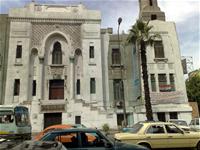 The main wishes of protesters are the 82-year old President Hosni Mubarak (a president for almost 30 years) to step down, not to stand again for the elections in September (as well as his son Gamal), corruption to be fought and a lot many in the same spirit.
The main wishes of protesters are the 82-year old President Hosni Mubarak (a president for almost 30 years) to step down, not to stand again for the elections in September (as well as his son Gamal), corruption to be fought and a lot many in the same spirit.
The reactions
Initially, because of the exciting TV footages showing hundreds of thousands of people in the capital Cairo, the United States and the European Union reacted similarly by defending people's aspirations for a better life and for democracy. A little later, though, the sobering down came. Democracy? In multimillion, poor and undereducated Egypt? Which is situated in the zone of the eternal conflict? An Egypt which was until now the strategic ally of the West in this very conflict? Which was a mediator? Probably these are the questions which the diplomatic policy makers in Washington and EU's capitals asked themselves before the various talking started.
First among the European countries, of course, were the usual suspects - the southern peripheral states, which are also the first stop of illegal immigrants from Northern Africa and the refugees from conflicts and poverty there, as well as the former colonial powers - Britain and France. It was no accident that the Greek prime 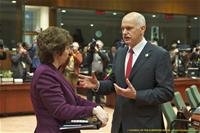 minister, Georgios Papandreou, was in the centre of the events and in a constant contact with EU's High Representative for External Affairs baroness Ashton.
minister, Georgios Papandreou, was in the centre of the events and in a constant contact with EU's High Representative for External Affairs baroness Ashton.
A failure of the Neighbourhood Policy
What were we thinking, what happened? The European Union was thinking 6-7 years ago that it had to approach in some way its neighbouring countries so that it could guarantee itself peace along the borders, reduction of the influx of immigrants and refugees and to facilitate trade. So, in 2004 the European Neighbourhood Policy was born, which covers all the neighbours of the EU - the North African countries, the Middle East, the Caucasus. Under the pressure of France during it presidency in 2008, and also for expedience, this policy has been divided into two parts: The Union of the Mediterranean, that engulfs the countries from the Mediterranean, and the Eastern Partnership, dealing with the countries in the post-Soviet domain.
ENP's main tool, of course, is money - 12 billion euro for 7 years for all the countries for the period 2007-2013. With this money the EU hoped to assist the democratic processes from within. Alas, now the logical question is - what did the EU get for its money? In fact, this is the problem - the EU did not know what to expect for its money. Besides, "until it is peaceful along the borders, it's alright" was the dictum of Europe for the last decade. From time to time deals were concluded with, to put it softly, undemocratic leaders so that the influx of immigrants is restrained or to secure access to lucrative business deals.
What EU's position actually is?
It will not be an overstatement if I say that EU's position actually is the position of Britain, France, Germany, Italy and Spain. And this is so because on February 3rd these five countries came out with a joint declaration, in spite the fact that the Foreign Affairs Council also discussed the situation in Egypt on January 31st and came up with conclusions on the issue. Anyway, the declaration of the five countries consists of the following sentences, telling the following:
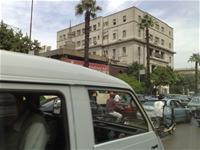 "We are watching with utmost concern the deteriorating situation in Egypt. The Egyptian people must be able to exercise freely their right to peaceful assembly, and enjoy the full protection of the security forces. Attacks against journalists are completely unacceptable.We condemn all those who use or encourage violence, which will only aggravate the political crisis in Egypt.Only a quick and orderly transition to a broad-based Government will make it possible to overcome the challenges Egypt is now facing. That transition process must start now".
"We are watching with utmost concern the deteriorating situation in Egypt. The Egyptian people must be able to exercise freely their right to peaceful assembly, and enjoy the full protection of the security forces. Attacks against journalists are completely unacceptable.We condemn all those who use or encourage violence, which will only aggravate the political crisis in Egypt.Only a quick and orderly transition to a broad-based Government will make it possible to overcome the challenges Egypt is now facing. That transition process must start now".
With this text, mot a mot, starts the declaration, attached as Annex II to the European Council conclusions from February 4th. Further on, the leaders of the 27 EU member states call on the Egyptian authorities to respond to the aspirations of the Egyptian people with political reforms, not with repression. Besides, the European Union commits itself to continue firmly with its full support for the transitional period toward democratic governance, pluralism, improved opportunities for economic prosperity and social inclusion, and also for enhanced regional stability. And one more very important thing, which practically admits ENP's failure - "The European Council is committed to a new partnership involving more effective support in the future to those countries which are pursuing political and economic reforms including through the European Neighbourhood Policy and the Union for the Mediterranean".
This could be interpreted as EU's attempt to continue to apply the ENP but under the condition - you get money for reforms.
The "unanimity", reached by the leaders of EU member states, was met with various reactions by the different political groups in the European Parliament. According to the co-president of the group of the Greens/European Free Alliance 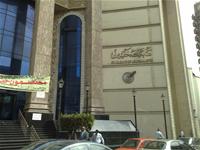 Daniel Cohn-Bendit, Europe has again not taken a firm position on Egypt. In his words, an immediate end of Mubarak's regime is necessary. "It is clear to all observers that a peaceful democratic transition, which the Egyptian people clearly want, will not be possible so long as Mubarak remains in power and continues to violently repress the protests. Sadly, EU leaders remain too cowardly, preferring to sit on the fence, rather than clearly supporting the protesters' will for a democratic transformation".
Daniel Cohn-Bendit, Europe has again not taken a firm position on Egypt. In his words, an immediate end of Mubarak's regime is necessary. "It is clear to all observers that a peaceful democratic transition, which the Egyptian people clearly want, will not be possible so long as Mubarak remains in power and continues to violently repress the protests. Sadly, EU leaders remain too cowardly, preferring to sit on the fence, rather than clearly supporting the protesters' will for a democratic transformation".
In a similar spirit was the statement of the leader of the Socialists and Democrats group Martin Schulz, who was even sharper: "Summit leaders appear to be taking the easy option of simply condemning the violence. They need to be much tougher and make it clear that Europe will not tolerate Mubarak clinging desperately to office. IA speedy transition, involving all democrats and civil society, is urgent. On foreign policy issues, the EU too often behaves like a frightened rabbit in the headlights of a car", Schulz added.
As could be expected, the majority in Parliament (the European People's Party) supported the declaration (page 14) after the Council. After the European Council itself, in the evening against the backdrop of the actual disintegration of the European Union to a euro area and the rest, the president of the European Council, Herman van Rompuy, and the European Commission President Jose Manuel Barroso were forced to explain to journalists that there was no conflict in the EU on the issue of Egypt. "We have a common position that doesn't mean that there is only one who can speak. But the most important thing is that this is the same message", Van Rompuy said.
Is the position of the EU right or wrong?
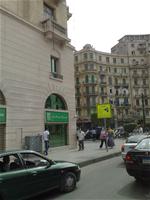 As is obvious from the various reactions, the "common" European position on Egypt was heavily criticised. That it is slow, that it was not timely, that it is not firm, that it is not single. The truth is that, from the point of view of the Union itself, its position that there must be a transitional period in Egypt towards democracy is right. Ms Ashton was also right when she said that the EU could not interfere in Egypt's internal affairs and cannot judge whether a candidate was better than another. From the point of view of the risks, though, EU's position is wrong. Because when you talk about democracy you come out from your own visions of democracy, which is wrong. You have to look at the situation from the point of view of the capabilities of the others.
As is obvious from the various reactions, the "common" European position on Egypt was heavily criticised. That it is slow, that it was not timely, that it is not firm, that it is not single. The truth is that, from the point of view of the Union itself, its position that there must be a transitional period in Egypt towards democracy is right. Ms Ashton was also right when she said that the EU could not interfere in Egypt's internal affairs and cannot judge whether a candidate was better than another. From the point of view of the risks, though, EU's position is wrong. Because when you talk about democracy you come out from your own visions of democracy, which is wrong. You have to look at the situation from the point of view of the capabilities of the others.
Is democracy in Egypt possible? Sometime in the future, maybe. For now, not much. Because behind the ostensible democracy which might emerge in the autumn, it is very likely that not very democratic-oriented elements like the Muslim Brotherhood and also as authoritarian as the present ones, can stand. Furthermore, Iran has already mentioned that an Islamic revolution has started in the Middle East. Whether this is a bluff we are yet to see, but for sure this is a mindset in not one or two countries in the region.
 | © The Council of the European Union
| © The Council of the European Union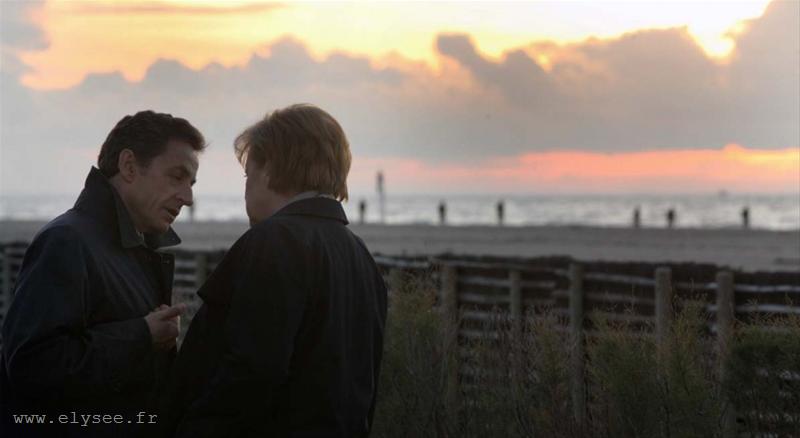 | © www.elysee.fr
| © www.elysee.fr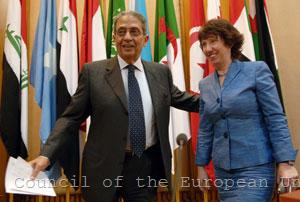 | © Council of the European Union
| © Council of the European Union